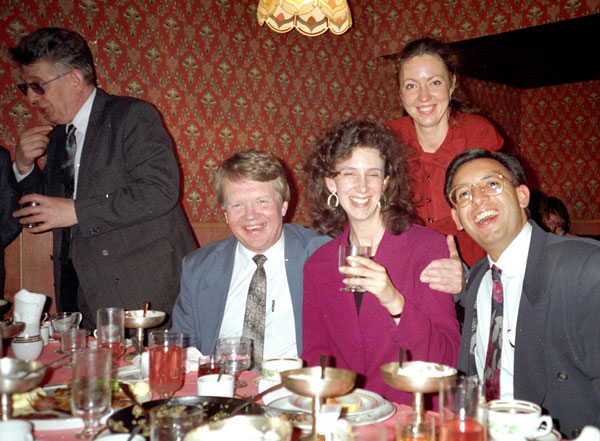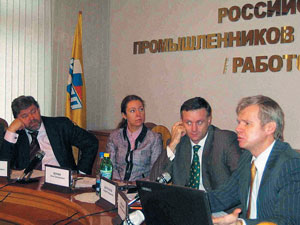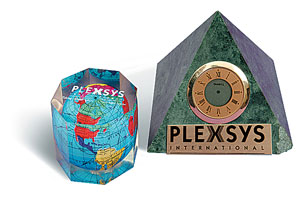 Plexsys was owned by the two Augie Fabelas – a junior and a senior.
Plexsys was owned by the two Augie Fabelas – a junior and a senior. A few years later the Fabelas sold the company, and nothing has been heard of it since.
All that remains are souvenir production samples.
CNPO Vympel also practically fell apart.
But in a few years, Fabela Jr. was to become one of the co-founders of VympelCom and my good friend. And our families would become very close, almost as if we were related.
But I’m getting ahead of myself here; let’s get back to the early 90s. What happened next?
Next I tried to contact MCC – Moscow Cellular Communications, which was either getting ready to start network operations using NMT-450, or was already doing it. For the first couple of years it supplied its clients with telephones that fit in a small suitcase.
I, still being very naive, tried to negotiate our participation in “developing the band” (the kind of terminology I used then).
I wasn’t allowed to see the president, Veronica Blomstedt, since, I was informed, she represented one of the company’s founding members, the globally renowned firm Millicom, and wouldn’t just talk to anyone. I was told all this by Khromov, their technical director, who responded to my overture with a polite but firm put-down…
The new standard GSM-900 was also totally unavailable; that license had already been issued to a new company, the future MTS, whose founders included some very well respected entities, such as MGTS.
Soon it became clear that the only possibility for us new kids on the block to get into the cellular business was to use a standard that no one else in Russia was using, on a frequency no one yet occupied. So we came to realize the need for a permit that would allow us to build an AMPS network, on the 800 MHz band.
In the interests of brevity, I will omit the story of how we obtained this permit, which took us all of the year 1992.
I just want to pay a tribute to the wisdom and the courage of the Communications Minister at the time, Vladimir Borisovich Bulgak, who agreed with us that in hungry and fateful times, one has to employ every means possible when starting a business, including the use of a cellular communications standards that might be considered exotic for Europe and Russia.
But let’s get back to the beginning of that critical year in our history, 1992.
In January the American partners of our future venture invited our delegation to visit Plexsys in the United States. The initial delegation list sent to the States for approval and visa support consisted of only upper-level managers at our headquarters and production plants. In the reply fax Fabela (who was paying for the whole trip) asked Vasiliy Bakhar to also include “the bold gentleman who was actively gesticulating at the last meeting.” So, that’s how I, and later one of my colleagues, Valery Trepakov, got on the delegation list. I never saw the fax, but was told about it later by Bakhar and both Fabelas (father and son).
For us, formerly absolute ‘non-travelers’, a trip to the United States from Moscow – so untidy and dreary with spookily empty store shelves – seemed and proved to be a real miracle.
I have very few photographs left from that trip, and of poor quality.
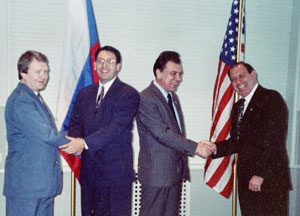 In the left picture, framed by the American flags and the flags of the recently formed Russian Federation, from left to right: Vasiliy Bakhar with Augie Fabela, Jr., and Vladimir Vinogradov (the chief engineer of the giant Vympel) with Augie Fabela, Sr., the owner of Plexsys.
In the left picture, framed by the American flags and the flags of the recently formed Russian Federation, from left to right: Vasiliy Bakhar with Augie Fabela, Jr., and Vladimir Vinogradov (the chief engineer of the giant Vympel) with Augie Fabela, Sr., the owner of Plexsys.
Vasiliy Bakhar was evidently one of the very few Vympel managers who could speak fluent English. He played a great role in the birth of Vympelcom.
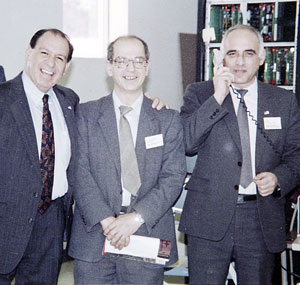 In the right photo – taken in one of the labs at Plexsys – is Augie Fabela, Sr., yours truly, and holding a telephone is Rafalovich, the chief engineer of one of Moscow’s largest research institutes, and a partner at Vympel – NIIDAR (acronym for Institute of Remote Radiolocation). The Institute and its plant are located next to the Preobrazhenskaya metro station. At present, NIIDAR, along with our dear RTI, are a part of Vladimir Yevtushenkov’s empire, AFK System. I don’t know what happened to Rafalovich; I heard he left the country. And a smart man he was, by the way.
In the right photo – taken in one of the labs at Plexsys – is Augie Fabela, Sr., yours truly, and holding a telephone is Rafalovich, the chief engineer of one of Moscow’s largest research institutes, and a partner at Vympel – NIIDAR (acronym for Institute of Remote Radiolocation). The Institute and its plant are located next to the Preobrazhenskaya metro station. At present, NIIDAR, along with our dear RTI, are a part of Vladimir Yevtushenkov’s empire, AFK System. I don’t know what happened to Rafalovich; I heard he left the country. And a smart man he was, by the way.
Before that trip I’d never held dollars in my hands or even seen them in real life. Just before we left, I had tried – and failed – to get them in Moscow. Vasiliy Bakhar was solving all of our delegation’s financial problems, while in America we were fully provided for by the Fabela family. So, in one of the first days of our week-long stay in America, Fabela Sr. asked each member of our delegation, which numbered eight people, to honor him by accepting a gift – an envelope containing $50 for personal needs. The delegation honored him by accepting the envelopes. These were the first dollar bills that I’d ever held in my hands. I spent them rather thoughtlessly, though.
A few years passed. Around 1998, Fabela, Sr. was visiting Moscow and we were having dinner at the Imperial restaurant in Gagarinsky Pereulok, not far from the metro Kropotkinskaya. I reminded everyone of that 6-year-old episode, and asked Fabela the honor of allowing me to return the old debt with interest, and accept an envelope – containing $5000. Naturally, he refused the envelope, but was touched and, I thought, even teared up.
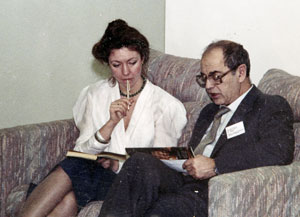 And in this picture from the Plexsys negotiating room you can see the charming Anechka Belova, the only woman in our delegation. At the time she was working for Bakhar and was taking part in endless meetings and preparing endless documents dealing with the creation of the joint ventures. Again, in this photo she and I are working on another letter establishing yet another joint venture
And in this picture from the Plexsys negotiating room you can see the charming Anechka Belova, the only woman in our delegation. At the time she was working for Bakhar and was taking part in endless meetings and preparing endless documents dealing with the creation of the joint ventures. Again, in this photo she and I are working on another letter establishing yet another joint venture
And here’s one more picture with her. Look at these young and happy faces. Look at how joyful our team is; look at these smiles, they are the reason I picked this shot. It is the end of 1992, at some meeting about the creation of Augie Fabela’s brainchild, a company called Euronet. The initial plan had Euronet providing the service, and VympelCom, one of the founders of Euronet, providing the engineering support. Later on, after Euronet had quietly ceased operations, Fabela bought shares in VympelCom and became one of its founders. Maybe later I’ll have a chance to tell this story too.
